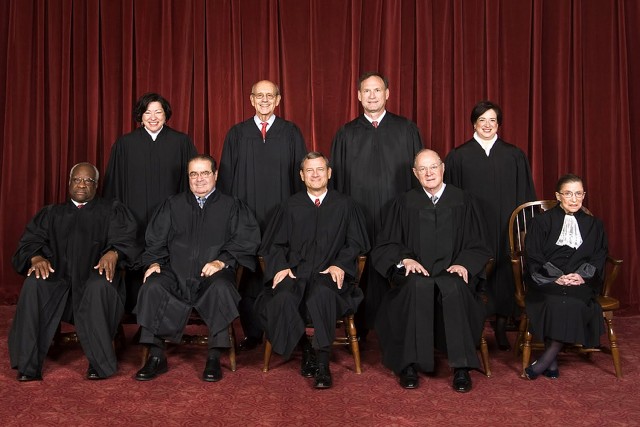Supreme Court may have decided gay marriage issue by not deciding

Many if not most observers expected the Supreme Court to take at least one of the cases for which review was sought in which the issue of whether same-sex marriage bans were constitutional was squarely presented.
None of the Supreme Court’s decisions in DOMA or the Prop. 8 litigation decided that issue.
But the Supreme Court did not take any of the cases, leaving in place Court of Appeals decisions that seem to clear the way for same-sex marriages in numerous states.
The Supreme Court had issued the first round of orders from the September 29 Conference last Thursday, adding eleven new cases to its docket for the new Term. Many people had anticipated that one or more of the same-sex marriage petitions might be on that list, but the Court did not act on any of them at the time. Last month Justice Ruth Bader Ginsburg had suggested that the Court might not step into the controversy at this point, because there was no disagreement among the lower courts on that issue. Today her prediction proved true, with the Court denying review (without any comment) of the seven petitions: Bogan v. Baskin (Indiana); Walker v. Wolf (Wisconsin); Herbert v. Kitchen (Utah); McQuigg v. Bostic (Virginia); Rainey v. Bostic (Virginia); Schaefer v. Bostic(Virginia); and Smith v. Bishop (Oklahoma).
The NY Times explains the impact:
The Supreme Court on Monday denied review in all five pending same-sex marriage cases, clearing the way for such marriages to proceed in Indiana, Oklahoma, Utah, Virginia and Wisconsin.The move was a major surprise and suggests that the justices are not going to intercede in the wave of decisions in favor of same-sex marriage at least until a federal appeals court upholds a state ban.The move will almost immediately increase the number of states allowing same-sex marriage from 19 to 24, along with the District of Columbia.The justices had earlier acted to stop same-sex marriages in Utah and Virginia, issuing stays to block appeals court rulings allowing them. Other appeals court decisions had been stayed by the appeals courts themselves.
Jonathan Adler writes that the Supreme Court might still take a case in the future, but I don’t see how that is realistic considering how expansive the pending cases were in terms of geography. In the states for which review was sought there will be marriages undertaken, a complicating factor if the court were to rule in the future that same-sex marriage bans were not unconstitutional.
Update: John Hinderaker at Power Line argues that if the court had taken the cases, the result (pro-gay marriage) was inevitable, and that one of the 4 conservative Justices must have voted not to take the case in order to avoid that result (4 Justices need to vote to take a case):
The Supreme Court opened the gay marriage floodgates last year, when it ruled in United States v. Windsor that major provisions of the Defense of Marriage Act were unconstitutional. Windsor purported to deal only with the rights of gay couples that already were legally married under the law of the state in which they reside….But Justice Scalia, also dissenting, wasn’t buying it. He wrote that the logic of Kennedy’s opinion inevitably implies that a constitutional right to gay marriage must be recognized….Lower courts have agreed with Justice Scalia, relying heavily on Kennedy’s Windsor [DOMA] opinion in finding a constitutional right to same sex marriage. I don’t see how anyone can read Kennedy’s opinion [in Windsor], which can reasonably be summarized as Hooray for gay marriage!, without concluding that the present Supreme Court would rule, 5-4, that a federal constitutional right to same sex marriage exists.So my guess is that one or more of the Court’s conservatives voted not to grant certiorari in order to deprive the present court of the opportunity to drive the final nail into the coffin of traditional marriage. If the current Supreme Court issues no further rulings on the subject, Windsor will be its last word, and Windsor says–whether sincerely or not–that it has nothing to do with a right to gay marriage. That leaves a bit of daylight, and it may be that a future Court, with one or more of the current justices replaced by a Republican president, might walk Windsor back from the precipice. That is a slender hope, to be sure, but surely a better chance than giving the current Court a shot at the last remaining issue relating to marriage. Which, I suspect, is why at least one of the Court’s conservatives voted to deny certiorari on the three circuit court decisions.
CLICK HERE FOR FULL VERSION OF THIS STORY